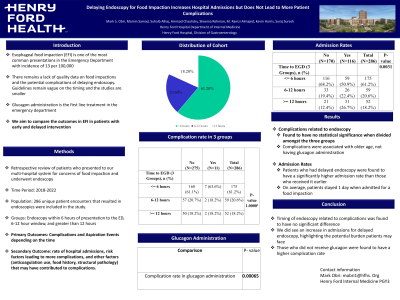Tuesday Poster Session
Category: Esophagus
P3237 - Delaying Endoscopy for Food Impaction Increases Hospital Admissions but Does Not Lead to More Patient Complications
Tuesday, October 24, 2023
10:30 AM - 4:00 PM PT
Location: Exhibit Hall

Has Audio
- MO
Mark Obri, MD
Henry Ford Hospital
Detroit, Michigan
Presenting Author(s)
Mark Obri, MD1, Kevin Harris, MD1, Suhaib Alhaj Ali, MD1, Momin Samad, MD2, Sheema Rehman, DO1, Ammad Chaudhary, MD1, Suraj Suresh, MD1
1Henry Ford Hospital, Detroit, MI; 2Henry Ford Hospital, Rochester Hills, MI
Introduction: Esophageal food impaction (FI) is a common presentation in the emergency room that often requires esophagogastroduodenoscopy (EGD) for resolution. Current guidelines recommend emergent/urgent interventions to mitigate the risk of complications such as mucosal tears or perforations. However, the available data on how patient outcomes differ based on the timing of endoscopic interventions remains limited. Additionally, there is a dearth of information regarding rates of aspiration, admission, and all-cause mortality in this population. We aim to evaluate the complication rate of esophageal FI based on timing of endoscopic intervention.
Methods: A retrospective cohort study was performed on patients who presented to our multi-hospital health system for concerns of food impaction from 2018-2022. Patients were included if required EGD for intervention. Complications were classified as tears, ulcerations or perforations. Patients were split into groups of < 6 hours, 6-11.9 hours, and >= 12 hours. Timing was based off initial presentation to the ED. ANOVA tests were used to compare groups.
Results: 600 patients presented during the study period with a primary complaint of food impaction. Of this group, 311 (51.8%) underwent EGD. 167 patients were included in the < 6 hours group, 86 patients in the 6-11.9 hours group, and 58 patients in the >12 hours group. 16 (5.1%) patients had a complication. There was no significant difference in complication rates when comparing the three groups with a f-value of 0.44 (p=.647234). There was no significant difference in the aspiration and mortality rates. There was a significant difference in the admission rate of patients with a f-value .45 at (p=0.000267) showing that patients at the 6-11.9 hour and >=12 hour mark were more likely to be admitted
Discussion: The timing of endoscopic intervention did not correlate with complication rates in esophageal FI. Consistent with recent studies, our findings suggest that urgent/emergent endoscopic intervention may not provide added benefit to patients presenting with esophageal FI. However, patients who underwent interventions later had a higher rate of admission, potentially leading to increased hospital burden and costs. Further investigations are warranted to evaluate the overall impact of delayed intervention on healthcare resource utilization in this population. These findings prompt a reevaluation of the current guidelines regarding the timing of endoscopic intervention in esophageal FI cases.
Disclosures:
Mark Obri, MD1, Kevin Harris, MD1, Suhaib Alhaj Ali, MD1, Momin Samad, MD2, Sheema Rehman, DO1, Ammad Chaudhary, MD1, Suraj Suresh, MD1. P3237 - Delaying Endoscopy for Food Impaction Increases Hospital Admissions but Does Not Lead to More Patient Complications, ACG 2023 Annual Scientific Meeting Abstracts. Vancouver, BC, Canada: American College of Gastroenterology.
1Henry Ford Hospital, Detroit, MI; 2Henry Ford Hospital, Rochester Hills, MI
Introduction: Esophageal food impaction (FI) is a common presentation in the emergency room that often requires esophagogastroduodenoscopy (EGD) for resolution. Current guidelines recommend emergent/urgent interventions to mitigate the risk of complications such as mucosal tears or perforations. However, the available data on how patient outcomes differ based on the timing of endoscopic interventions remains limited. Additionally, there is a dearth of information regarding rates of aspiration, admission, and all-cause mortality in this population. We aim to evaluate the complication rate of esophageal FI based on timing of endoscopic intervention.
Methods: A retrospective cohort study was performed on patients who presented to our multi-hospital health system for concerns of food impaction from 2018-2022. Patients were included if required EGD for intervention. Complications were classified as tears, ulcerations or perforations. Patients were split into groups of < 6 hours, 6-11.9 hours, and >= 12 hours. Timing was based off initial presentation to the ED. ANOVA tests were used to compare groups.
Results: 600 patients presented during the study period with a primary complaint of food impaction. Of this group, 311 (51.8%) underwent EGD. 167 patients were included in the < 6 hours group, 86 patients in the 6-11.9 hours group, and 58 patients in the >12 hours group. 16 (5.1%) patients had a complication. There was no significant difference in complication rates when comparing the three groups with a f-value of 0.44 (p=.647234). There was no significant difference in the aspiration and mortality rates. There was a significant difference in the admission rate of patients with a f-value .45 at (p=0.000267) showing that patients at the 6-11.9 hour and >=12 hour mark were more likely to be admitted
Discussion: The timing of endoscopic intervention did not correlate with complication rates in esophageal FI. Consistent with recent studies, our findings suggest that urgent/emergent endoscopic intervention may not provide added benefit to patients presenting with esophageal FI. However, patients who underwent interventions later had a higher rate of admission, potentially leading to increased hospital burden and costs. Further investigations are warranted to evaluate the overall impact of delayed intervention on healthcare resource utilization in this population. These findings prompt a reevaluation of the current guidelines regarding the timing of endoscopic intervention in esophageal FI cases.
Disclosures:
Mark Obri indicated no relevant financial relationships.
Kevin Harris indicated no relevant financial relationships.
Suhaib Alhaj Ali indicated no relevant financial relationships.
Momin Samad indicated no relevant financial relationships.
Sheema Rehman indicated no relevant financial relationships.
Ammad Chaudhary indicated no relevant financial relationships.
Suraj Suresh indicated no relevant financial relationships.
Mark Obri, MD1, Kevin Harris, MD1, Suhaib Alhaj Ali, MD1, Momin Samad, MD2, Sheema Rehman, DO1, Ammad Chaudhary, MD1, Suraj Suresh, MD1. P3237 - Delaying Endoscopy for Food Impaction Increases Hospital Admissions but Does Not Lead to More Patient Complications, ACG 2023 Annual Scientific Meeting Abstracts. Vancouver, BC, Canada: American College of Gastroenterology.
